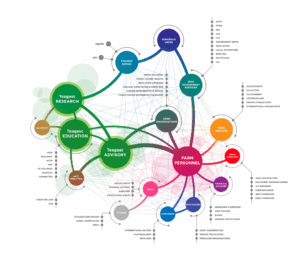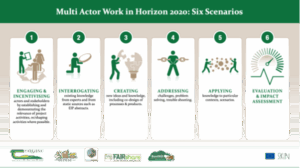Agri-Innovation & Learning (AgILe) Living Laboratory
The Agri-Innovation & Learning (AgILe) group at the Department of Agri-Food Business and Spatial Analysis has been leading and applying a Living Laboratory approach since 2011. Involving diverse sectoral actors across agriculture, rural development, and wider innovation systems, the AgILe Living Laboratory addresses challenges across the domains of sustainability, agricultural production, governance, and community well-being.
Governance
The AgILe Living Laboratory sits within Teagasc’s established governance framework for research integrity, financial accountability, ethics, and stakeholder engagement. Within this framework, an adaptive governance model is used to support the Living Laboratory’s activities in project cycles. A bespoke governance panel is formed and operates for the duration of each cycle, representing all the relevant actors and stakeholders such as farmers, scientists, advisors, policy-makers, community representatives, creative practitioners, and researchers. These panels shape the project’s strategic direction, review progress, and ensure alignment with societal needs and Living Lab principles of openness, inclusivity, and shared value creation. Located within Teagasc, the AgILe Living Lab is strengthened by its positioning within a tripartite organisation (agricultural research, education and advisory services) that is integrated to Ireland’s Agricultural Knowledge and Innovation Systems (AKIS) and networked with international AKISs EU-wide.

Strategic objectives and expected results
The Living Lab’s mission is to support co-creation and co-design for sustainable agricultural and rural innovation, aligning with EU and Irish policy priorities.
Short-term objectives
- Support multi-actor innovation processes addressing specific agricultural, environmental, and social challenges.
- Test and refine participatory methodologies and digital/behavioural toolboxes.
Medium-term objectives
- Consolidate a transferable, flexible governance and methodological framework for co-creation processes across sectors.
- Strengthen networks linking Teagasc, communities, and European Living Labs.
Long-term objectives
- Contribute to Ireland’s leadership in transdisciplinary agricultural innovation.
- Institutionalise participatory innovation as a sustainable governance approach within Teagasc and national policy frameworks.
Methodology
A comprehensive toolbox of participatory methods to operationalise and support the Living Laboratory approach has been co-developed on the basis of user experience in diverse projects spanning over a decade. The toolbox supports the Living Lab innovation lifecycle, described by ENoLL, across four phases:
- Exploration
- Co-creation
- Experimentation
- Evaluation
These phases occur within three broad and overlapping spaces: problem, solution, deployment.
Eight steps are mapped to each of the spaces.
Problem space
- Context and need identification,
- Stakeholder recruitment and engagement
- Requirement definition
Solution space
- Ideation and co-creation
- Prototyping and development
- Experimentation in real-life contexts
Deployment space
- Evaluation and validation
- Scaling and sustainability
Our Living Laboratory toolbox matches the challenges and opportunities of these phases, spaces and steps, and provides practical tools to address them. The toolbox is structured into six scenarios, which like the phases, spaces and steps above, are not sequential or discrete, but are mutually supportive and overlapping.

The video below explains the AgILe Living Lab Toolbox
Living Laboratory Projects Cycle Timeline
- 2025-2028: DAFM/Horizon Europe Agroecology Partnership
- 2024-2027: Sustainable Livestock Systems, Transition and Evidence Platform for Upgrading Policies (STEP UP)
- 2018-2024: Behaviours for Safer Farming (BeSafe)
- 2020-2023: Ploutos – Data-driven, Sustainable Agri-Food chains
- 2020-2021: Development of a welfare strategy for Ireland’s Horse Racing Sector
- 2020-ongoing: Signpost Farm Programme
- 2019-2022: CattleDiversa
- 2018-2023: Farm Advisory digital Innovation tools Realised and Shared (FAIRShare)
- 2018-2020: Welfare and Biosecurity of Farmed Animals (SWAB)
- 2018-2022: Better Rural Innovation: Linking Actors, Instruments and Policies through Networks (LIAISON)
- 2017-2023: Knowledge Hub for a Sustainable Irish Bioeconomy
- 2016-2020: Short Supply Chain Knowledge and Innovation Network (SKIN)
- 2016-2020: Cereal Renaissance in Rural Europe: managing diversity in food systems (CERERE)
- 2016-2020: Building an interactive AgriDemo-Hub community: enhancing farmer to farmer learning (AGRI-Demo)
- 2013-2016: Joint Ventures to Enhance the Demographic Profile and Socio-Economic Sustainability of Irish Farming (Join-to-Farm)
- 2013-2017: AgILeTECH
- 2012-2017: ICON-MAP
Contact Áine Macken-Walsh, Principal Investigator of the various project cycles operating within the lab, for more information.
